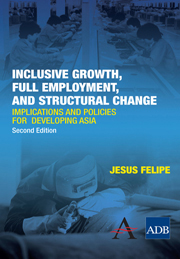 Inclusive Growth, Full Employment, and Structural Change
Inclusive Growth, Full Employment, and Structural Change Book contents
- Frontmatter
- Contents
- Illustrations
- Abbreviations
- Foreword
- Preface and Acknowledgments
- Executive Summary
- Chapter 1 What Is Inclusive Growth?
- Chapter 2 What Is the Main Constraint that Developing Countries Face?
- Chapter 3 Why Full Employment and Who Should Be Responsible for Trying to Achieve It?
- Chapter 4 Why Is Growth Unstable?
- Chapter 5 What Is the Role of Agriculture in the Process of Structural Change and in Delivering Full Employment? Full Employment I
- Chapter 6 What Is the Role of Investment in Delivering Full Employment? Full Employment II
- Chapter 7 Why Is “Planning Development” Necessary?
- Chapter 8 What Is Industrial Policy? Full Employment III
- Chapter 9 Structural Transformation, Industrialization, and Technological Change in Developing Asia: What Does the Empirical Evidence Show?
- Chapter 10 Why Do Export Diversification and Sophistication Matter?
- Chapter 11 Unemployment Versus Inflation: Which One Should Be the Public Enemy Number One?
- Chapter 12 What Should Be the Role of Fiscal and Monetary Policies for Development? Full Employment IV
- Chapter 13 Is It Possible to Achieve Full Employment in the Presence of Structural Transformation?
- Chapter 14 Should the Government (Public Sector) Intervene Directly and Become the Employer of Last Resort? Full Employment V
- Chapter 15 Can Competitiveness and Globalization Deliver Inclusiveness and Full Employment?
- Chapter 16 Export-Led Growth or Domestic Demand–Led Growth?
- Chapter 17 Is Education a Key Ingredient of Inclusive Growth?
- Chapter 18 Conclusions: How Can Developing Countries Implement an Inclusive-Growth and Full-Employment Strategy?
- References
- Author Index
- Subject Index
Chapter 15 - Can Competitiveness and Globalization Deliver Inclusiveness and Full Employment?
- Frontmatter
- Contents
- Illustrations
- Abbreviations
- Foreword
- Preface and Acknowledgments
- Executive Summary
- Chapter 1 What Is Inclusive Growth?
- Chapter 2 What Is the Main Constraint that Developing Countries Face?
- Chapter 3 Why Full Employment and Who Should Be Responsible for Trying to Achieve It?
- Chapter 4 Why Is Growth Unstable?
- Chapter 5 What Is the Role of Agriculture in the Process of Structural Change and in Delivering Full Employment? Full Employment I
- Chapter 6 What Is the Role of Investment in Delivering Full Employment? Full Employment II
- Chapter 7 Why Is “Planning Development” Necessary?
- Chapter 8 What Is Industrial Policy? Full Employment III
- Chapter 9 Structural Transformation, Industrialization, and Technological Change in Developing Asia: What Does the Empirical Evidence Show?
- Chapter 10 Why Do Export Diversification and Sophistication Matter?
- Chapter 11 Unemployment Versus Inflation: Which One Should Be the Public Enemy Number One?
- Chapter 12 What Should Be the Role of Fiscal and Monetary Policies for Development? Full Employment IV
- Chapter 13 Is It Possible to Achieve Full Employment in the Presence of Structural Transformation?
- Chapter 14 Should the Government (Public Sector) Intervene Directly and Become the Employer of Last Resort? Full Employment V
- Chapter 15 Can Competitiveness and Globalization Deliver Inclusiveness and Full Employment?
- Chapter 16 Export-Led Growth or Domestic Demand–Led Growth?
- Chapter 17 Is Education a Key Ingredient of Inclusive Growth?
- Chapter 18 Conclusions: How Can Developing Countries Implement an Inclusive-Growth and Full-Employment Strategy?
- References
- Author Index
- Subject Index
Summary
As I noted in the preface, globalization has thrown development economics into a quagmire. Often arguments in recent growth debates are framed in the context of competitiveness (especially when the speaker or writer wants to appeal to policy makers). This is very problematic because while in the business world the term “competitiveness” has a clear meaning—a firm that is not competitive will lose market share and eventually will go out of business—its counterpart at the aggregate level (a nation) might be a “can of worms.” In this chapter, I will elaborate on some of the implications of competitiveness and globalization, particularly on the policy prescription that developing countries should adopt a liberal policy stance.
At the level of the firm, competitiveness is a question of competition among individual companies, that is, about the mechanisms that help more productive and efficient companies expand and take market share from the less productive ones, which then go out of business or become more efficient. The most effective way for policy makers to help individual firms to increase productivity is to create the conditions in each sector for fierce but fair competition among all participating firms. This means that policy makers in an economy can help speed up growth by enacting regulations that support more competition in each sector and by removing factors that obstruct competition.
- Type
- Chapter
- Information
- Inclusive Growth, Full Employment, and Structural ChangeImplications and Policies for Developing Asia, pp. 235 - 260Publisher: Anthem PressPrint publication year: 2010


